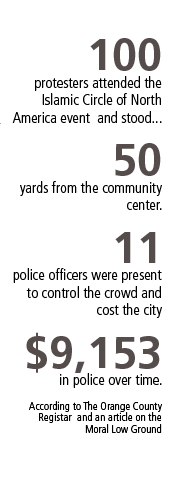Students must stand up to hate
We’d all like to think weíre tolerant people. We’d like to think we’re owners of a multicultural mindset adapted from our own broad diversity at MVHS. That’s what America’s about, right?
But when the Islamic Circle of North America’s innocent charity fundraising dinner in Yorba Linda, California was protested against on Feb. 13 with crude chants of “go back home” from a crowd that included city council members, local religious leaders—and even congressmen—we were shocked. Or at least that’s what we’d like to think.
The truth is, most of us didn’t know about the relief effort to support U.S. women’s shelters, homelessness, and hunger that was so rudely interrupted by a protest funded by numerous American extremist hate groups. And we left it up to just one self-organized group of 20 MVHS students to patch up the fresh wounds of racial intolerance with a day of fasting on March 18. 
It’s easy to ignore the issue with the excuse of not pertaining to the group being oppressed. And it’s easy to toss the gravity of the issue aside as the insignificant ideas of just another small-scale hate group.
Yet it’s our collective responsibility to keep the kinds of sentiments expressed at the rally—from Republican Congressman Ed Royce’s well-received scorn of Americanís burgeoning multiculturalism to Villa Park republican councilwoman Deborah Pauly’s claim of knowing “quite a few Marines who would be quite happy to help these ‘terrorists’ to an early meeting in paradise”—far away from MVHS’s student body.
What needs to be done here isn’t a matter of whether it’s an American issue or even a Muslim issue. It’s a human issue.
As students, the responsibility lies upon us more than anyone else to strike down oppressive ideas before they can get a chance to start. Subtle racism that we downplay as jokes doesn’t take much to rise to levels exhibited last February, and isn’t so much different from the concept of gay jokes that the Gay-Straight Alliance has been attempting to address. When it comes to situations like this, not being the one oppressed doesn’t mean you shouldn’t stand up against what’s going on—if anything, it offers an even greater meaning to fighting intolerance, one that transcends looking out for yourself and delves into the greater force of caring for others and their freedoms. It’s time we stopped thinking only about our own needs and started thinking about the far-reaching implications of our own daily actions.
We pertain a school with a diverse body of people, making it our duty more than anyone’s to support our local and national Muslim communities in their efforts to restore the peace we all claim to hold so dearly. It’s crucial for us to immediately take up our responsibility to make sure racism stays out of our community by keeping our expressed opinions peaceful, even in jokes. That’s the only way by which we can ever hope to strike down this small-minded and misplaced sense of prejudice in our society.
There’s no telling which group of people might be the next target of racism, and no telling how severe things might get. It’s critical that we instate a large level of focus on awareness across campus, providing positive change that we can carry on into the world to keep racism at bay when it counts the most.
If we don’t come together for this common beneficial cause, any of us might wind up with our own crowd of oppressors and no one to stand up for us.
And by that time, it just might be too late.








